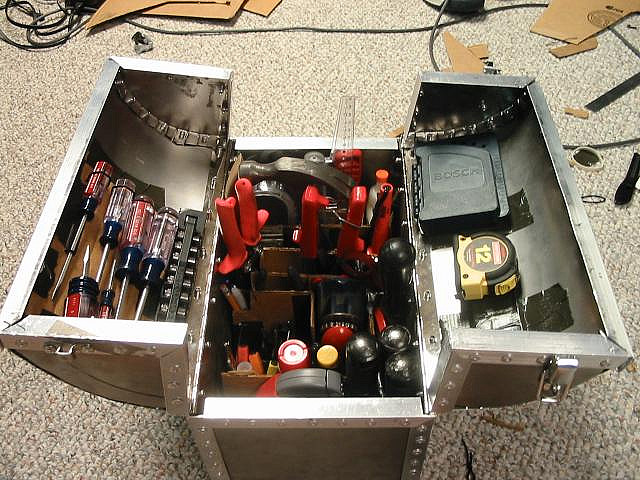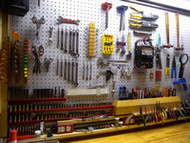Taking Good Care of Your Tools: Storing Your Tools
Published by Priscilla on 13th Nov 2014
Storing Your Tools Properly

|
Taking good care of your tools is essential to their long life and safe function. Good tools are expensive, and it’s definitely worth the extra effort to keep them functioning in prime condition. In the end it will save you save you time and money, and ensure that your projects are finished faster, with fewer hassles and errors that result from poorly maintained equipment. These guidelines apply to all kinds of tools, though this blog entry, as well as the next three entries, will specifically address hand tools and power tools. Still, the same guidelines apply for your other tools of choice. Store them well, keep them clean and well-maintained, and they’ll reward you for your efforts. |
|
Storing your tools in the
right environment is essential. For hand tools especially, a proper storage
system is a must. That system could be a toolbox, storage container, shelving
unit, or your own alternative solution or combination of these options.
Proper storage of your tools not only protects your tools, but it helps keep them in top condition. Whichever option you go for, make sure that your tools are kept somewhere with minimal moisture and few temperature changes. This will help prevent rust and weakening caused by the expansion and contraction that goes along with temperature fluctuations. |

|
|
Naturally, you should pick a solution that works with the space you have. Pegboards are great space savers, or you could store your tools in boxes, bags, drawers or on shelves in your shop. So long as the storage system you choose is convenient, protects your tools adequately, and most importantly works with the space you have, you are on the right track. One good option is to use a smaller tool bag for the tools you use most often, and to keep the rest of your selection in your primary toolbox. Hanging tools on the wall is also a great option. When they are on the wall they are easily accessible, off the ground, and protected from moisture. Don’t leave your power tools out of the loop either. Keep them protected from dust, moisture and temperature fluctuations by storing them properly as well. If you can, keep them in their original cases. If you have any old wooden boxes that tools used to be packaged in, they also make great storage places. If you don’t have a case or a box, tuck them away in storage drawers or tool chests. Remember, if it’s possible you should keep them in a garage or basement with a moderately controlled climate. Not only will proper storage protect your tools, but it will also keep them organized so you can easily find whichever tool you need. |
|
|
|
Don’t forget to check the instruction manuals for all of your tools. They’ll have information on how you need to care for your specific tool, what replacement parts you’ll need other important pieces of information. Store your instruction manuals in a drawer or cabinet in your work area so you always know where they are, and so they are on hand if you need them. Part of proper storage is putting your tools away properly after you’re done with a job. You should have a space where you can inspect your tools and perform necessary maintenance. Cover your worktable or bench with newspaper or plastic sheeting to protect the table and to make clean up easier. |
|
Setting up a storage space for your tools and properly organizing them can be a big project, but the time and money you will end up saving are well worth the time and effort. |
|
Image Citations:
Tools on Wooden Wall - Pixabay Free Use Image
Full Tool Box - Image by Austin & Zack {link to https://www.flickr.com/photos/zakh/}. - See more at: https://creativecommons.org/licenses/by-nc-sa/2.0/legalcode
Tool Shelves - Image by mtneer_man {link to https://www.flickr.com/photos/mtneer_man/- See more at: https://creativecommons.org/licenses/by-nc-sa/2.0/legalcode
Pegboard with Tools - Image by mtneer_man {link to https://www.flickr.com/photos/mtneer_man/- See more at: https://creativecommons.org/licenses/by-nc-sa/2.0/legalcode


